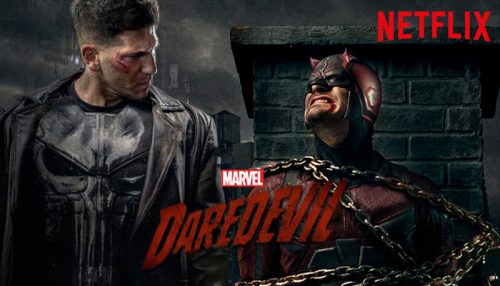
A brief review of the Persistent Widow parable from Luke 18, which many folks heard at church this past Sunday. It’s a short little parable of a widow with a just grievance. The local judge, however, is corrupt, and he refuses to hear the case. So the widow relentlessly pesters the judge until he finally agrees to hear her out to “see that she gets justice.”
The point of the parable is made clear at its telling: “Jesus told his disciples a parable to show them that they should always pray and not give up.” To quote our friend Derek Webb, there is a promise from God that “this too shall be made right,” including whatever hardship you, I, or the disciples may be experiencing. But the parable ends with a word of doubt from Jesus–will anyone actually believe that, “when the man comes around” (Johnny Cash), He’ll bring fair and equitable solutions to the world’s problems?

It’s a question fitting for 2016 as well, and the election cycle puts it in stark contrast. As DZ dissected in his Surviving November series, we’d do best to forget about relativism as a cultural umbrella; we live in an age obsessed with fairness and morality. There isn’t one square inch of this election cycle that hasn’t been baptized in the language of justice, whether it’s the greed of the one-percent, the racism of the rural populous, the sexism of the privileged, the corruption of the DC elite, or the ethics of charitable foundations. You might argue this election has been defined by frustrations with injustice, and certainly, there are many injustices in 2016 that need to be addressed.
With this righteous quest on our minds, twitter sends us a year-old article from The National Review that’s as fresh and applicable as the day it was published, ht fredosphere. (Probably goes without saying but if Gospel truth can be found in places like disco music, recovery programs, and public radio, it can be found in starkly partisan publications too). The essay in question finds Kevin D. Williamson riffing on the theological truth that human beings are less concerned with justice and more concerned with punishment.
Knowing good and evil, we are obliged to pass judgment. We are called upon to do acts of mercy, but we also are called upon to do justice, which is not only feeding the poor and caring for the widow but also ensuring that they are protected from those who would do violence to them. We must punish. Knowing good and knowing evil, we take up the burden of both. Perhaps the non-believers will find as much truth in that as those on the kneelers.
The duty to punish is distinct from the desire to punish. Consider the now-abandoned but eminently civilized custom of the executioner begging the condemned for his forgiveness before chopping off his head, a humane recognition of the fact that what is transpiring is not between two men but between a man and mankind, or at least the portion of it that forms the polity around him. There’s something in that redolent of the old Chuck Jones cartoon with Ralph E. Wolf and Sam Sheepdog, who greet each other with courteous familiarity on the way to work in the morning, punch the time-clock, spend the morning trying to murder each other, clock out, chat amicably over their lunch break, clock back in, and spend the afternoon trying to murder each other before parting as friendly colleagues at day’s end.
The desire to punish distorts policy-making decisions across the political spectrum… Much of our thinking about welfare and unemployment benefits is shaped by punitive thinking, by the desire to exact vengeance upon our fellow citizens for the crime of malingering on welfare or unemployment. It isn’t that malingering (and fraud, and abuse, and waste, and the rest of it) doesn’t happen, or that it isn’t important. The problem is that the desire to enact punitive policies often runs counter to the necessity of enacting effective policies. For example, it may be the case that people should be more enterprising and more willing to take on the risk and discomfort of relocating to a new city when there is no satisfactory work to be found where one is. But that is not how (some) people are. If we want to make policies based on how things and people and institutions are rather than based on how we think they should be — which is to say, if we wish to address reality rather than a set of metaphysical preferences shared by the policymaking elite — then punitive measures are only relevant to the extent that they cause actual changes in behavior.
It’s a convincing argument, and if you’re not allergic to the partisan way in which Williamson discusses this insight with specific policy matters, you can read the whole piece. His insights on the language of “get tough” are particularly astute:
In the American political parlance, the desire to punish most often is expressed by the words “Get tough.” There are addicts in the policymaking class, but not those kinds of addicts: addicts who sleep in the street, who dabble in prostitution and petty larceny, who peddle drugs themselves. We didn’t just “get tough” with these people — we declared war on them. We “got tough” on drugs rather than help addicts, as though a few months in prison makes an addict anything other than an addict with new traumas and additional criminal skills. To think otherwise would be “impermissible weakness,” no doubt.
…San Francisco had only two DUI arrests on New Year’s Eve last year [editor’s note- that’s 2014], the lowest in some time. What was the public-policy miracle that achieved that? Uber. Researchers at Temple University have suggested that Uber — specifically, the inexpensive decentralized Uber X service — could prevent as many as 500 vehicular homicides nationally if universally available… When I was a student at the University of Texas, a wise if paternalistic arrangement between the university and the local taxi companies ensured that any student who felt he was too drunk to drive home could simply show a taxi driver his student ID and be taken home. (But not to another bar.) Yes, yes, spoiled stupid college kids ought to act like grown-ups. Q: Do we want to “get tough” on DUI — or do we want to reduce DUI?
There’s a lot to look at here. We could go down the rabbit hole of laws aimed at fostering behavioral change all day long. But the more immediate insight, or at least the one that hits closest to home in this election cycle, is that the desire to punish is as part of human nature as any other sin. There’s something about the division of righteous and unrighteous, the punisher and the punished, that’s part of our spiritual DNA. It’s what social science is trying to get at with the Argumentative Theory of Reason. See also the list of cognitive biases in The Mental Health Issue.

Which is, why, I think, Jesus’s hope in response to injustice in this parable is prayer. If the insight is that human beings are not fair or just in their default settings, prayer becomes a mechanism of humble trust. It’s the anti-activity, it’s the power of powerlessness, it’s the acknowledgement that someone else will deal with the grievance. It’s also the acknowledgment that, when a widow pesters a judge about us, a third party that allows the possibility of forgiveness is not such a bad thing.
Prayer shaming aside, social media grief aside, this divine passivity is what Jesus embraces in the next bible chapter, in Luke 19, as he enters Jerusalem anticipating his execution. The crowd on Good Friday was exhibit A for the human desire to punish which overwhelms any sense of justice. Thankfully, in the cross, we see a different, alien, and divine mix–the duty to punish, and the desire not to punish. And any God who embraces that mix of values is one worth praying to.

COMMENTS
2 responses to “The Duty vs. the Desire to Punish”
Leave a Reply















I’m really impressed that you were able to utilize the scene in Daredevil that explains the philosophical differences between Daredevil and the Punisher through pictures alone, allowing the text of the article to draw the clear parallels. Brilliant!
Thanks Cal! Glad someone else go it. I was thinking of photos, and I was like “oh man, I can’t *not* use this scene!”